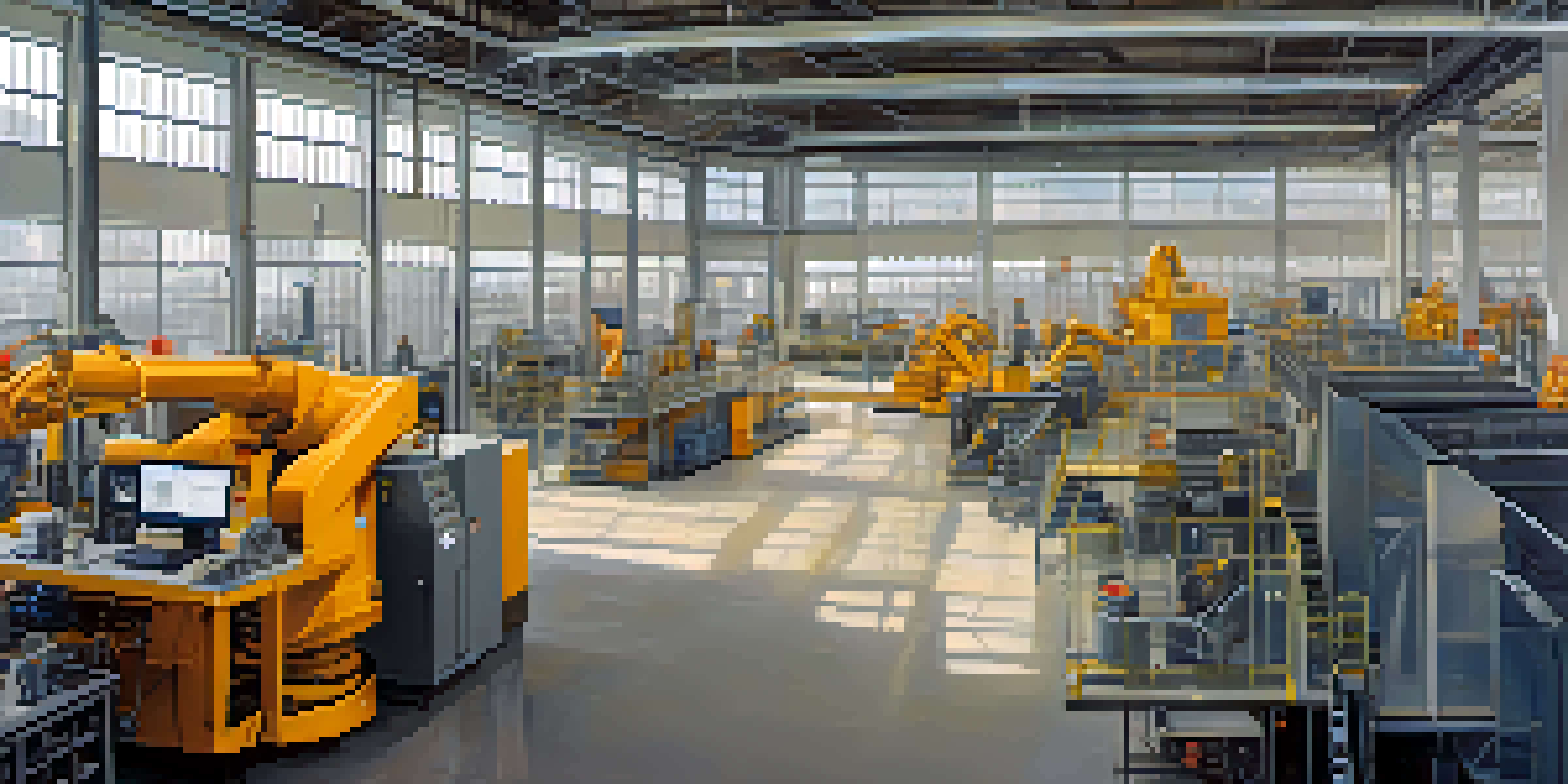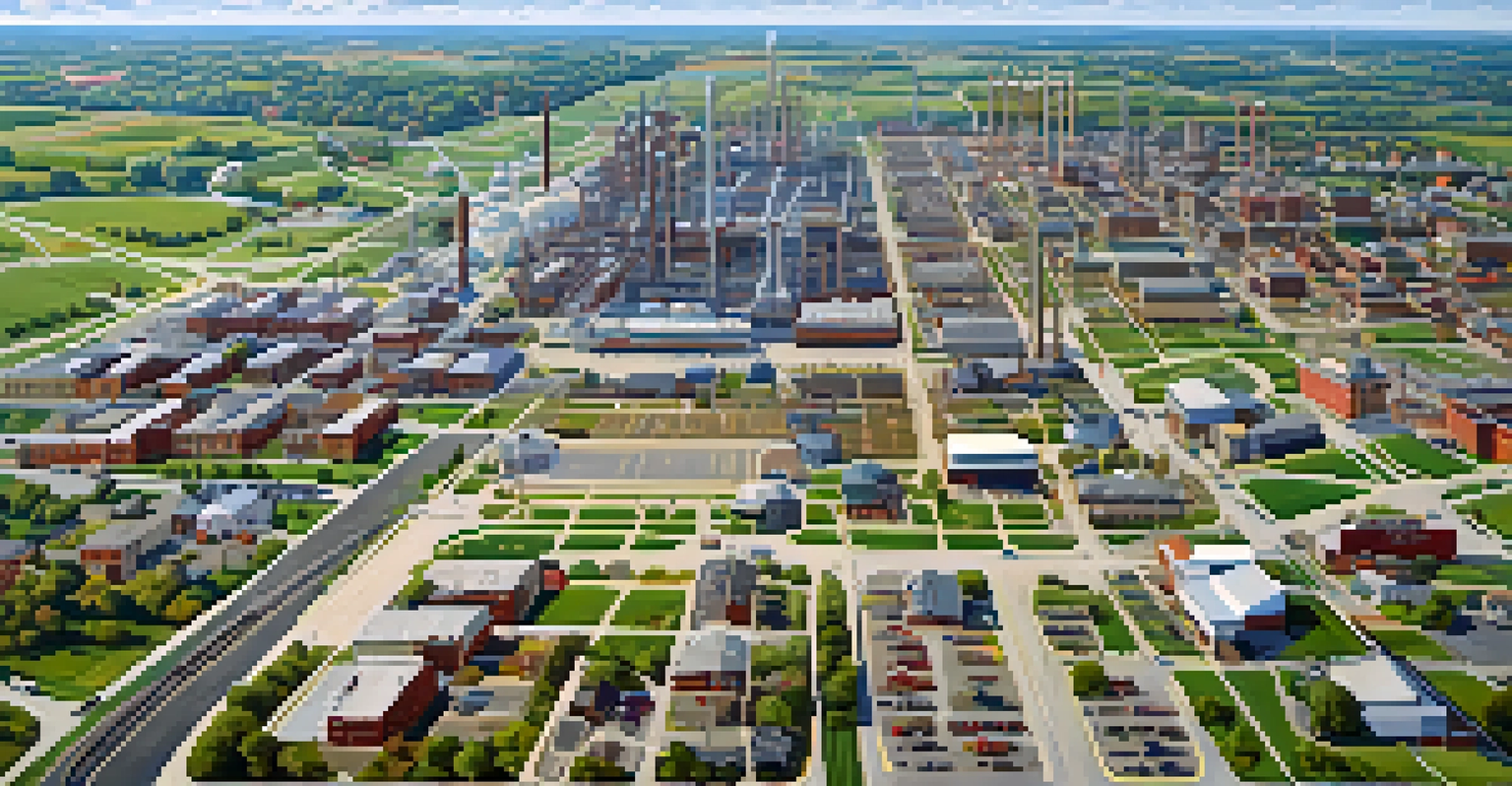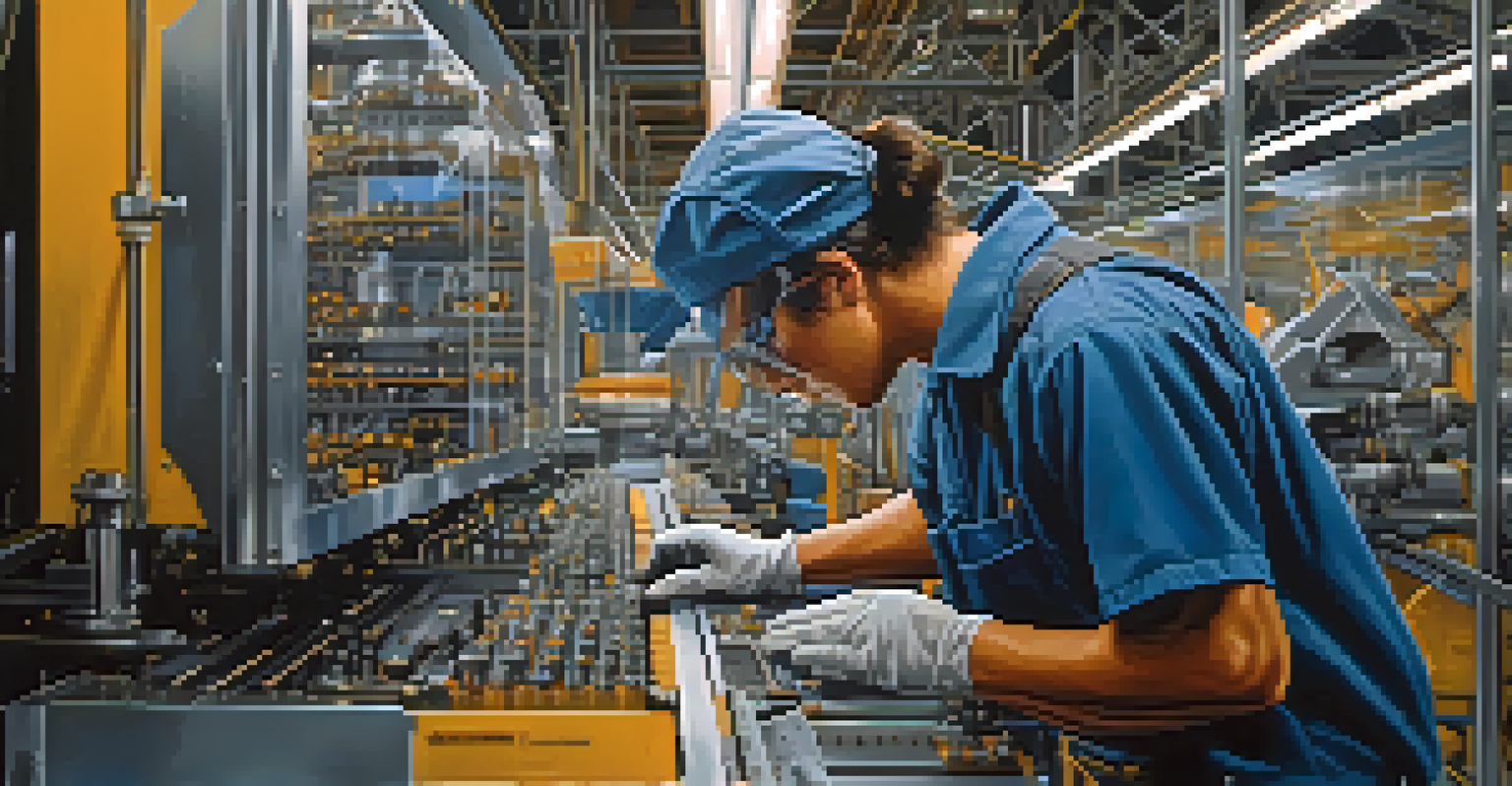Kansas Manufacturing Sector: Key Players and Economic Growth

Overview of Kansas Manufacturing Sector and Its Importance
The manufacturing sector in Kansas plays a vital role in the state's economy, contributing significantly to job creation and GDP growth. With a diverse range of industries, including aerospace, food processing, and machinery, Kansas has established itself as a manufacturing powerhouse. This sector not only supports local economies but also drives innovation and competitiveness on a national level.
Manufacturing is the backbone of our economy and the key to our nation’s prosperity.
In recent years, the state's manufacturing output has shown impressive growth, reflecting the resilience of its key players. Kansas manufacturers have adapted to market changes by embracing technology and sustainability practices, making them more efficient and environmentally friendly. With a strong workforce and a commitment to quality, these industries are well-positioned for future growth.
As we delve deeper into the key players in Kansas manufacturing, it becomes clear that their collective contributions are instrumental in shaping the economic landscape of the state. Understanding their impact helps us appreciate the broader implications for job creation, investment, and community development.
Key Players in Kansas Manufacturing: A Closer Look
Kansas is home to several influential manufacturing companies that have made substantial contributions to the sector. Notable players include Spirit AeroSystems, which specializes in aerospace components, and Garmin, known for its innovative technology products. These companies not only provide thousands of jobs but also foster a culture of innovation within the state.

In addition to large corporations, Kansas boasts a robust network of small and medium-sized enterprises (SMEs) that are crucial to the manufacturing ecosystem. These SMEs often focus on niche markets, providing specialized products and services that cater to various industries. Their agility and creativity enable them to respond swiftly to market demands, making them essential partners in the manufacturing landscape.
Manufacturing Drives Kansas Economy
The manufacturing sector significantly contributes to job creation and GDP growth in Kansas, making it a vital part of the state's economy.
Collaboration between these key players and local educational institutions further strengthens the manufacturing sector. Programs focused on skills training and workforce development ensure that Kansas has a skilled labor pool ready to meet the industry's evolving needs.
Economic Contributions of Kansas Manufacturing Sector
The economic contributions of the Kansas manufacturing sector are profound, with billions of dollars generated annually. This sector not only adds value through production but also creates a ripple effect that supports various other industries, including transportation, logistics, and retail. The interconnectedness of these sectors illustrates the importance of manufacturing as a backbone of the Kansas economy.
Innovation distinguishes between a leader and a follower.
Moreover, manufacturing jobs often pay higher wages compared to other sectors, contributing to a better quality of life for many residents. As these companies invest in technology and training, they also elevate the skill levels of their workforce, leading to increased productivity and economic advancement.
The overall impact is evident in the growth of communities across Kansas, where manufacturing facilities often lead to infrastructure improvements and increased local services. This symbiotic relationship between manufacturing and community development fosters a thriving economic environment.
Innovation in Kansas Manufacturing: Technology and Trends
Innovation is at the heart of Kansas's manufacturing sector, with companies increasingly adopting advanced technologies. From automation and robotics to artificial intelligence, these tools are transforming traditional manufacturing processes, enhancing efficiency and reducing costs. The shift toward smart manufacturing is not just a trend; it’s reshaping how businesses operate.
For instance, many Kansas manufacturers are investing in Internet of Things (IoT) devices to monitor production in real-time. This connectivity allows for immediate adjustments, minimizing downtime and waste. As manufacturers embrace these innovations, they are also paving the way for more sustainable practices, such as reducing energy consumption and minimizing environmental impact.
Innovation Shapes Future Growth
Kansas manufacturers are increasingly adopting advanced technologies, which enhances efficiency and positions the state competitively in the global market.
Kansas is also seeing a rise in research and development initiatives aimed at fostering innovation. Collaborations between industry and academic institutions are driving breakthroughs that benefit both the economy and the environment, ensuring Kansas remains competitive on a global scale.
Challenges Facing Kansas Manufacturers Today
Despite the numerous advantages, Kansas manufacturers face several challenges that could hinder growth. One of the most significant issues is the ongoing labor shortage, as companies struggle to find skilled workers to fill critical positions. This gap can lead to increased production costs and slowed growth, highlighting the need for effective workforce development strategies.
Additionally, supply chain disruptions, exacerbated by global events and local factors, can impact the efficiency of manufacturing operations. These disruptions not only affect production schedules but also challenge companies to maintain consistent quality and delivery times. Manufacturers must navigate these complexities while striving to meet customer demands.
Lastly, regulatory compliance and the need for sustainable practices are becoming increasingly important. Manufacturers in Kansas must balance profitability with environmental responsibility, often requiring significant investment in new technologies and processes. Addressing these challenges will be crucial for the sector's continued success.
Future Outlook for Kansas Manufacturing Sector
The future of the Kansas manufacturing sector looks promising, with several trends indicating potential growth. As companies continue to innovate and invest in technology, they are likely to enhance their competitive edge, both nationally and internationally. This forward-thinking approach positions Kansas as an attractive location for future investments in manufacturing.
Moreover, the increasing emphasis on sustainability and green manufacturing practices presents new opportunities. Companies that prioritize environmentally friendly processes are not only appealing to consumers but are also likely to benefit from incentives and support from state and federal programs.
Challenges Impacting Growth
Labor shortages, supply chain disruptions, and the need for sustainable practices present significant challenges to the continued success of Kansas manufacturing.
As the industry evolves, collaboration among manufacturers, educational institutions, and policymakers will be essential. By working together, they can address challenges, leverage opportunities, and create a robust ecosystem that supports sustainable growth in Kansas manufacturing.
Conclusion: The Vital Role of Manufacturing in Kansas Economy
In conclusion, the manufacturing sector in Kansas is a vital component of the state's economy, driving job creation, innovation, and community development. The diverse range of key players, from large corporations to small businesses, contributes to a dynamic and resilient manufacturing landscape. As challenges arise, the sector's ability to adapt and innovate will determine its future success.
Investment in technology and workforce development will be crucial in maintaining the competitive advantage of Kansas manufacturers. The commitment to sustainability and collaboration will further enhance the sector's impact, ensuring that it meets both current and future demands.

Ultimately, the health of the manufacturing sector will continue to influence the overall economic growth of Kansas. By recognizing its importance and supporting its development, the state can look forward to a bright and prosperous future.